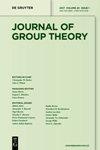Structure of the Macdonald groups in one parameter
IF 0.5
3区 数学
Q4 MATHEMATICS
引用次数: 3
Abstract
Abstract Consider the Macdonald groups麦克唐纳群在一个参数中的结构
考虑麦克唐纳群G≠(α)=⟨A,B∣A [A,B]=A α,B [B,A]=B α⟩G(\alpha)= \langle A,B \mid A^{[A,B]}=A^ {\alpha},\,B^{[B,A]}=B^ {\alpha}\rangle, α∈Z \alpha\in\mathbb{Z}。我们填补了Macdonald证明G(α) G(\alpha)总是幂零的空白,并进一步确定了G(α) G(\alpha)的阶、上、下中心级数、幂零类和指数。
本文章由计算机程序翻译,如有差异,请以英文原文为准。
求助全文
约1分钟内获得全文
求助全文
来源期刊

Journal of Group Theory
数学-数学
CiteScore
1.00
自引率
0.00%
发文量
45
审稿时长
6 months
期刊介绍:
The Journal of Group Theory is devoted to the publication of original research articles in all aspects of group theory. Articles concerning applications of group theory and articles from research areas which have a significant impact on group theory will also be considered.
Topics:
Group Theory-
Representation Theory of Groups-
Computational Aspects of Group Theory-
Combinatorics and Graph Theory-
Algebra and Number Theory
 求助内容:
求助内容: 应助结果提醒方式:
应助结果提醒方式:


